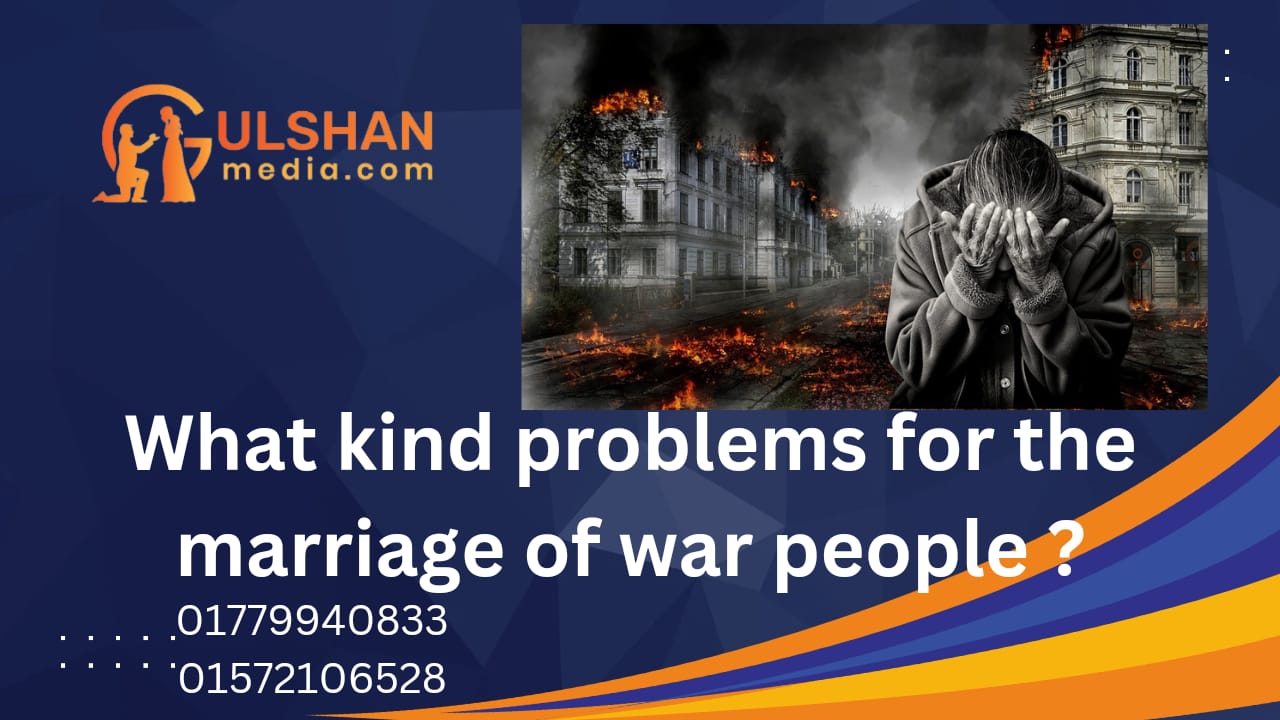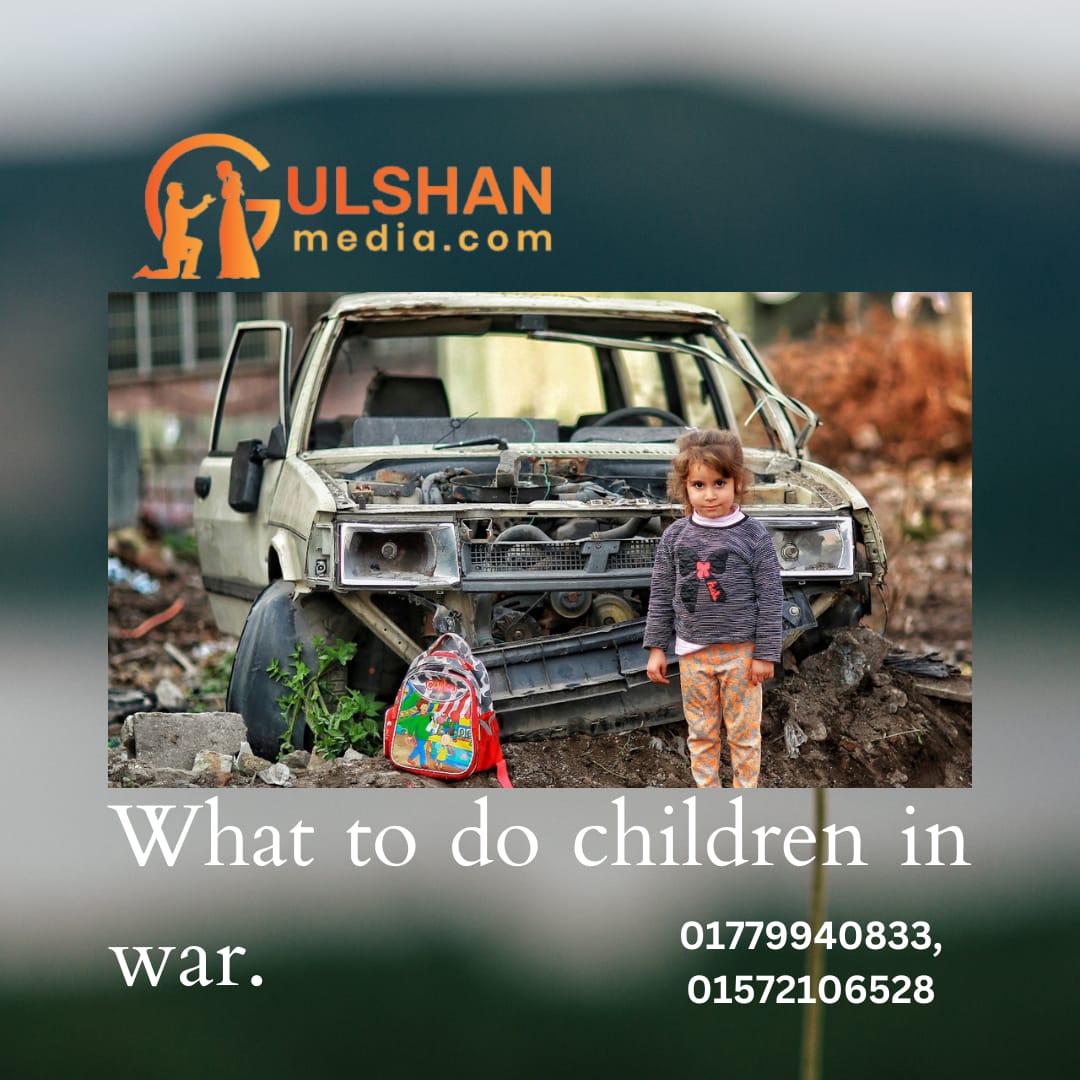What kind problems for the marriage of war people ?
What kind problems for the marriage of war people ?

- Marriage for war people can be a challenging experience. Some of the problems that war people may face in their marriages include:
- Post-traumatic stress disorder (PTSD): PTSD is a mental health condition that can develop after exposure to a traumatic event, such as war. Symptoms of PTSD can include anxiety, flashbacks, nightmares, and difficulty sleeping. These symptoms can make it difficult to maintain a healthy and supportive relationship.
- Trust issues: War can erode trust in people and institutions. This can make it difficult for war people to trust their spouses and build a strong foundation for their marriage.
- Communication problems: War people may have difficulty communicating their feelings and experiences to their spouses. This can lead to misunderstandings and conflict.
- Financial difficulties: War can lead to financial hardship. This can put stress on marriages and make it difficult to meet the basic needs of the family.
- Lack of support: War people may not have access to the support they need to manage their PTSD, trust issues, communication problems, and financial difficulties. This can make it difficult to maintain a healthy marriage.
In addition to these general challenges, war people may also face specific problems in their marriages related to their military service. For example, they may be:
- Deployed: Deployments can be very stressful for both the service member and their spouse. The service member may be worried about their safety and the safety of their loved ones back home. The spouse may be worried about how they will cope without their partner. Deployments can also lead to financial difficulties, as the service member may be paid less while they are deployed.
- Stationed overseas: Stationing overseas can also be stressful for war people and their spouses. The service member may have to adjust to a new culture and language. The spouse may have to leave their job and friends behind. Stationing overseas can also make it difficult to maintain relationships with family and friends back home.
- Injured or disabled: War people who are injured or disabled may face additional challenges in their marriages. They may need to adjust to a new lifestyle and may have difficulty finding employment. They may also have physical or emotional problems that can make it difficult to maintain a close relationship with their spouse.
PTSD can have a significant impact on marriage. People with PTSD may experience flashbacks, nightmares, and intrusive thoughts about their traumatic experiences. They may also avoid situations that remind them of their trauma, and they may have difficulty sleeping and concentrating. These symptoms can make it difficult to maintain a close and supportive relationship.
In addition, people with PTSD may have difficulty trusting others and may be hypervigilant, or constantly on alert for danger. This can make it difficult to feel safe and secure in a relationship.
Trust issues and marriage
Trust is essential for a healthy marriage. When war people have difficulty trusting their spouses, it can create a lot of tension and conflict in the relationship. They may become suspicious of their spouse’s motives and may be reluctant to share their own feelings and experiences. This can lead to a sense of isolation and loneliness in the marriage.
Communication problems and marriage
War people may have difficulty communicating their feelings and experiences to their spouses. This can be due to a number of factors, including the trauma they have experienced, the stigma associated with mental health problems, and the difficulty of finding words to describe their experiences.
Communication problems can make it difficult for war people to build intimacy and trust with their spouses. They may also lead to misunderstandings and conflict.
Financial difficulties and marriage
War can lead to financial hardship for both individuals and families. This can put a lot of stress on marriages. When couples are struggling to make ends meet, it can be difficult to find time and energy for each other. Financial difficulties can also lead to arguments and resentment.
Lack of support and marriage
War people may not have access to the support they need to manage their PTSD, trust issues, communication problems, and financial difficulties. This can make it difficult to maintain a healthy marriage.
How to overcome the challenges of marriage for war people
There are a number of things that war people and their spouses can do to overcome the challenges of marriage.
- Seek professional help: If you or your spouse are struggling with PTSD, trust issues, communication problems, or financial difficulties, seek professional help. A therapist can help you develop coping mechanisms and strategies for building a strong marriage.
- Communicate with your spouse: It is important to communicate with your spouse about your experiences, feelings, and needs. Be honest and open with your spouse, and try to listen to their perspective as well.
- Build trust: Trust is essential for a healthy marriage. Take the time to build trust with your spouse by being reliable, honest, and supportive.
- Be patient: It takes time to heal from the effects of war. Be patient with
Sources

What to do for children in war.
Children are among the most vulnerable victims of war. They are often the first to be killed, injured, or displaced. They are also more likely to experience psychological trauma, which can have long-term consequences for their health and well-being.
There are a number of things that can be done to help children in war. Some of the most important things include:
- Protect them from harm: This means providing them with safe shelter, food, and water. It also means protecting them from violence, exploitation, and abuse.
- Help them to heal: Children who have experienced war need help to heal from the trauma they have experienced. This can be done through counseling, play therapy, and other supportive services.
- Educate them: Education is essential for children in war. It gives them the knowledge and skills they need to rebuild their lives and contribute to their communities.
- Reintegrate them into their communities: Once the war is over, children need to be reintegrated into their communities. This means helping them to find a safe place to live, go to school, and play. It also means helping them to reconnect with their families and friends.
Here are some specific things that can be done to help children in war:
- Provide them with safe shelter: This could include providing them with tents or other temporary housing, or helping them to repair their homes.
- Provide them with food and water: This could include providing them with food rations, or helping them to access clean water sources.
- Provide them with medical care: This could include providing them with first aid, or transporting them to hospitals for more specialized care.
- Provide them with education: This could include setting up temporary schools, or providing them with access to distance learning programs.
- Provide them with psychosocial support: This could include providing them with counseling, play therapy, or other supportive services to help them cope with the trauma they have experienced.
Here are some additional things that can be done to help children in war:
- Support organizations that are working to help children in war: There are a number of organizations that are working to help children in war. You can support their work by donating to them, volunteering your time, or spreading the word about their work.
- Advocate for policies that protect children in war: You can advocate for policies that protect children in war by contacting your elected officials and urging them to support legislation that protects children in war.
- Raise awareness about the plight of children in war: You can raise awareness about the plight of children in war by talking to your friends and family about the issue, and by sharing information about it on social media.
Here are some tips for helping children who have experienced war:
- Be patient and understanding: It takes time for children to heal from the trauma of war. Be patient with them and understand that they may be going through a difficult time.
- Create a safe and supportive environment: Children need to feel safe and supported in order to heal. Create a safe and supportive environment for them by providing them with a loving and stable home, and by being there for them when they need you.
- Help them to process their experiences: Children need help to process their experiences of war. This can be done through talking to them about their experiences, or through helping them to express their emotions through creative activities such as art, music, and play.
- Seek professional help if needed: If you are concerned about the well-being of a child who has experienced war, seek professional help from a counselor or therapist.
Conclusion
Children in war are among the most vulnerable victims of conflict. There are a number of things that can be done to help them, including providing them with safe shelter, food, water, medical care, education, and psychosocial support. You can also help children in war by supporting organizations that are working to help them, advocating for policies that protect children in war, and raising awareness about the plight of children in war.
How do you see the war world humanity ?
War has been a part of the human experience for as long as we have recorded history. It is a complex and devastating phenomenon that has had a profound impact on individuals, societies, and the world as a whole.
There are many different perspectives on war. Some people see it as a necessary evil, a way to resolve conflict and protect our interests. Others see it as a barbaric and pointless exercise in violence. Still others see it as a complex and multifaceted phenomenon that cannot be easily reduced to a single explanation.
Regardless of one’s perspective, it is clear that war is a serious problem. In recent years, the world has seen an increase in the number of armed conflicts, as well as the number of civilian casualties. The rise of new technologies, such as drones and autonomous weapons, has also made war more deadly and destructive.
The war in Ukraine is a stark reminder of the devastating consequences of war. The conflict has caused a humanitarian crisis, with millions of people displaced from their homes and thousands killed. It has also had a significant impact on the global economy, disrupting supply chains and driving up energy prices.
The war in Ukraine is just one example of the many conflicts that are currently taking place around the world. Other notable examples include the wars in Syria, Yemen, and Ethiopia. These conflicts are all complex and have their own unique root causes. However, they all share one thing in common: they are all causing immense suffering and destruction.
In addition to the immediate human cost, war also has a number of long-term negative consequences. It can damage infrastructure, disrupt economies, and displace people from their homes. It can also lead to the spread of disease, the rise of extremism, and the collapse of social order.
Despite the devastating consequences of war, there are some signs of hope. In recent years, there has been a growing movement to promote peace and non-violence. This movement includes a wide range of organizations and individuals, from grassroots activists to world leaders.
The peace movement has made some progress in recent years. For example, the number of nuclear weapons has declined significantly since the end of the Cold War. In addition, there are now more international treaties and agreements in place to prevent and resolve conflict peacefully.
However, there is still much work to be done. The world is still a very violent place, and war remains a major problem. It is important to continue to work for peace and non-violence, and to support the organizations and individuals that are working to build a more peaceful world.
Here are some specific things that can be done to reduce the risk of war and to build a more peaceful world:
- Promote diplomacy and dialogue: Diplomacy and dialogue are essential tools for resolving conflict peacefully. Governments should invest in diplomacy and dialogue as a means of preventing and resolving conflict.
- Strengthen international institutions: International institutions, such as the United Nations, play an important role in promoting peace and security. Governments should support these institutions and work to strengthen their effectiveness.
- Reduce military spending: Governments should reduce their military spending and divert the resources saved to other areas, such as education, healthcare, and development.
- Educate for peace: Education is essential for building a more peaceful world. Schools should teach students about the importance of peace and non-violence.
- Promote social justice: Social injustice is a root cause of many conflicts. Governments should work to promote social justice and reduce inequality.
Building a more peaceful world is a challenging task, but it is an essential one. By working together, we can create a world where war is no longer a part of the human experience.








